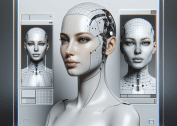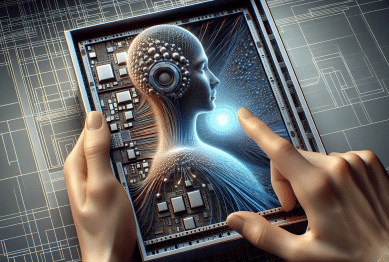Explore how quantum computing is reshaping technology and the potential implications for everything from cybersecurity to artificial intelligence. Uncover the science, practical examples, and anticipated impact behind this major shift in computing power.
Understanding Quantum Computing in The Real World
Quantum computing is emerging as a fascinating alternative to classical computers, promising to tackle problems previously considered unsolvable. The technology is based on quantum bits, or qubits, which behave differently from standard bits. Unlike bits that exist clearly as either a 0 or 1, qubits can be both at the same time through quantum superposition. This allows quantum computing to process information far more efficiently for specific types of problems, opening the door for new algorithms and breakthroughs in science and industry. As a result, researchers are eager to uncover how quantum processors could revolutionize industries and improve everyday life.
Applications of quantum computers are already surfacing, sparking conversations about their potential impact. While traditional processors perform tasks sequentially, the peculiar nature of quantum entanglement means a quantum system can evaluate many possibilities simultaneously. This speed is a game-changer for fields such as complex simulations, cryptography, and optimization. Businesses are exploring how they might use quantum power to address logistics, financial modeling, and even weather forecasting—challenges that would take classical computers years or centuries to solve.
The science may sound abstract, but practical developments are underway globally. Major companies and universities compete to create more stable and scalable quantum computers. Even industry giants like IBM and Google have built prototype quantum systems available for public experimentation. These early machines, though not yet universally applicable, offer a glimpse into the possibilities on the horizon. It is clear that quantum computing is no longer theoretical; its evolution is happening in real-time, with real consequences for data security and the broader tech landscape.
The Difference Between Classical and Quantum Computing
One of the biggest distinctions between classical and quantum computing rests on how information is stored and manipulated. Conventional computers store information using bits—tiny transistors that are either on or off, representing binary 1s and 0s. This system works perfectly for routine calculations and everyday software. However, some computations require exponentially more resources as they scale, quickly outpacing even the fastest supercomputers. Quantum computers address this challenge by utilizing qubits, which can interact and overlap in complex states, dramatically expanding their capacities.
Quantum computing’s strength is parallelism. By exploiting superposition and entanglement, quantum devices can solve certain problems much more rapidly. For example, factoring large numbers—an essential process in cryptography—could be accomplished in seconds by a mature quantum computer compared to many years with the most advanced classical systems. Scientists are actively working to develop error correction and increase qubit stability to make such achievements routine rather than experimental.
Despite the promise, quantum computing presents unique engineering obstacles. Qubits are extremely sensitive to environmental disturbances, which can cause errors during processing. Achieving quantum supremacy—demonstrating that quantum machines outperform classical analogues for specific tasks—remains a major focus for both private companies and research institutions. Nonetheless, recent experiments exhibit steady improvement, propelling the field forward and driving anticipation for mainstream breakthroughs.
Quantum Computing and the Future of Cybersecurity
The discussion around quantum computing has cybersecurity professionals both excited and apprehensive. Quantum computers have the potential to break widely used encryption methods, such as RSA, that safeguard sensitive information. These encryption algorithms rely on the difficulty of factoring large numbers—a task classical computers find hard but quantum computers may solve very quickly. This shift could prompt a rapid transformation in online security practices, with governments and companies prioritizing post-quantum cryptography and related research.
Many experts are collaborating to prepare for the so-called ‘quantum threat’. This involves developing new cryptographic protocols resistant to quantum decryption. The National Institute of Standards and Technology (NIST) is leading multi-year efforts to formalize standards for quantum-resilient encryption. While quantum hacking is currently theoretical for most practical purposes, the drive for robust digital security has already accelerated innovation and new partnerships across global industry and academia.
It’s worth emphasizing that while quantum computers may pose risks to current cryptography, they could also improve defenses. Quantum-based communication methods, such as quantum key distribution, can theoretically guarantee secure data transfer by detecting any eavesdropping attempts. As quantum technologies progress, they’re likely to reshape how individuals and organizations approach both offensive and defensive aspects of digital security.
Artificial Intelligence Meets Quantum Computing
The intersection of artificial intelligence (AI) and quantum computing holds enormous promise. Some researchers predict quantum computers could enhance machine learning, making AI smarter and more autonomous. By handling enormous datasets and highly complex calculations quickly, quantum processors can accelerate the training of AI models, potentially unveiling new solutions to today’s toughest problems. Key innovation is happening in fields like natural language processing, optimization, and drug discovery, where speed and parallelism can offer huge advantages.
Collaboration is on the rise between AI and quantum teams, leading to the creation of new algorithms specifically designed for quantum architectures. Enhanced pattern recognition and the ability to search large, unstructured datasets more efficiently are anticipated benefits. Additionally, emerging uses include quantum-enhanced optimization for logistics, financial analysis, and even energy grid management. Quantum advantage may not be immediate in all machine learning applications, but its foundational impact is generating real excitement in the tech world.
Many organizations are investing in quantum AI research, both to sharpen their competitive edge and to understand the evolving limitations. As more quantum computers become accessible for experimentation, knowledge gained in this hybrid field is expected to influence everything from self-driving vehicles to automated scientific discovery. These early collaborations will shape the understanding of quantum computing’s future capacity for accelerating AI progress.
Accessible Quantum Computing: Public and Educational Initiatives
Not that long ago, quantum computing was relegated to cutting-edge research labs. Today, it is increasingly available to students, educators, and even hobbyists looking to understand the basic principles. Cloud-based quantum computers provided by organizations such as IBM allow users to experiment with quantum algorithms using public interfaces and simulators. This has demystified quantum technology and enabled a new generation of learners to explore concepts previously considered too advanced.
Open learning resources and structured online courses are another major driver of accessibility. Renowned universities and tech giants offer free and low-cost educational quantum programs online. These initiatives include interactive tutorials and virtual labs, allowing curious learners to run code on real quantum hardware, wherever they are. Such democratization ensures a more diverse pool of talent working toward quantum breakthroughs, and supports wide-scale adoption in the long run.
Government agencies and nonprofits are supporting outreach by offering grants and curriculum development for quantum education. At the same time, university partnerships nurture cutting-edge research projects and foster hands-on experience. These educational pathways give both early-career and veteran technologists tools they need to participate in what may be one of the next revolutions in computing.
The Future of Quantum Computing: Challenges and Opportunities
Looking ahead, the future of quantum computing appears both complex and promising. The greatest technical challenge lies in building reliable, scalable quantum systems. Researchers must overcome issues including error rates, qubit coherence, and hardware design. Although milestones have already been hit, moving from tens to thousands or millions of stable qubits is necessary before universal quantum computing becomes practical for commercial and research applications. The process will require international collaboration, substantial investment, and ongoing innovation.
Quantum computing also prompts big questions for society at large. Ethical dilemmas are emerging about who controls powerful computation, how data is protected, and the societal impact of automation. Experts urge early policy discussions and responsible development practices. Enabling a broad, informed understanding of quantum technology can empower more people to help shape its direction and ensure the benefits are widely distributed.
The opportunities outweigh the challenges for many industry watchers. Solutions to global-scale scientific issues—ranging from climate modeling to complex pharmaceuticals—could become possible. Quantum breakthroughs may unlock new fields altogether, just as classical computers sparked revolutions in communication, business, and gaming. As the field advances, curiosity and open-mindedness will stay vital. Quantum computing’s impact is only beginning to unfold, and its promise lies in discovery.
References
1. IBM. (n.d.). Learn quantum computation using Qiskit. Retrieved from https://qiskit.org/learn/
2. National Institute of Standards and Technology. (n.d.). Post-Quantum Cryptography. Retrieved from https://csrc.nist.gov/Projects/post-quantum-cryptography
3. Google AI Blog. (n.d.). Quantum Supremacy Using a Programmable Superconducting Processor. Retrieved from https://ai.googleblog.com/2019/10/quantum-supremacy-using-programmable.html
4. Quantum Country. (n.d.). How does quantum computing work? Retrieved from https://quantum.country/qcvc
5. MIT OpenCourseWare. (n.d.). Quantum Computation. Retrieved from https://ocw.mit.edu/courses/6-845-quantum-complexity-theory-spring-2010/pages/lecture-notes/
6. European Quantum Flagship. (n.d.). Quantum Technologies Education. Retrieved from https://qt.eu/applications/education/










 Why Offbeat Travel Destinations Keep Surprising You
Why Offbeat Travel Destinations Keep Surprising You 

